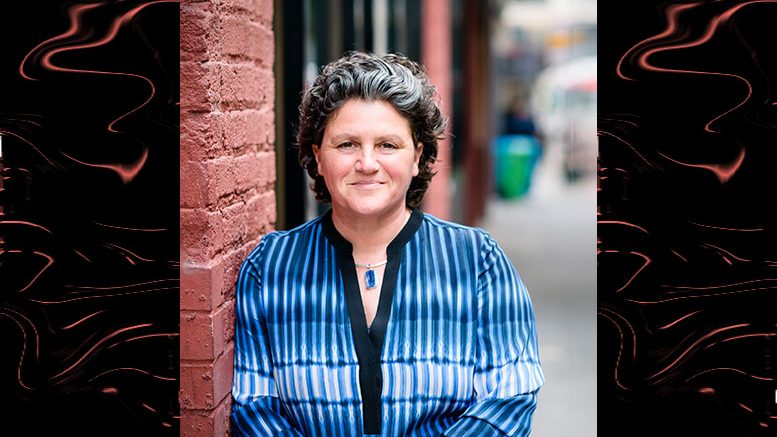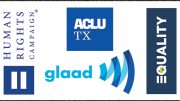If you haven’t yet made her acquaintance, get ready to see a lot of Ellen LaPointe. The longtime social justice activist, attorney, and nonprofit leader took over as Fenway Health’s new CEO March 9 and she’s itching to get to work and meet folks in the neighborhood and the LGBTQIA+ community.
“I’m completely honored to be invited to take on this role,” says the native New Englander (she’s Maine born and bred), who returned to the East Coast to lead Fenway Health after 27 years away.
LaPointe spent the last five years as President and Chief Executive Officer of Northern California Grantmakers (NCG) in San Francisco, a nonprofit that brings together Bay Area philanthropists to advance the common good. She is credited with strengthening NCG’s leading role within a member-based philanthropic community that gives over $3.5 billion annually and transforming the organization’s culture, including the establishment of a robust equity framework aimed at making the organization’s priorities and practices more inclusive.
Previously, LaPointe served as Vice President of Strategic Partnerships at HopeLab, which focuses on technology-based approaches to promoting positive health behavior, and as Executive Director of Project Inform, the HIV advocacy organization. LaPointe began her career as Coordinator of the Brown University AIDS Program and then moved to San Francisco to become Director of Clinical Research at Saint Francis Memorial Hospital. She later practiced law at a large firm, where she represented pro bono clients in cases involving marriage equality, wrongful eviction, end-of-life liberty, and other matters.
In this interview, LaPointe discusses the current political climate around LGBTQIA+ health care, her vision for Fenway Health’s future, the impact of her AIDS advocacy work in the early days of the epidemic on professional choices and leadership style, and more. (To hear more from LaPointe, check out this Pride in HealthCare podcast interview with her and this video introduction!)
Q: This is a presidential election year and health care has been a huge part of the political discussion for Democratic candidates, particularly around Medicare For All. Additionally, the U.S. Supreme Court will be hearing a case that could result in a declaration that the Affordable Care Act, which has been a literal lifeline for thousands of LGBTQIA+ people and people living with HIV, is unconstitutional. What role should Fenway Health play in this debate about the U.S. healthcare system?
A: First and foremost, the job of Fenway Health is to provide excellent health care to our patients, regardless of ability to pay. We’ll continue to do that regardless of what’s happening politically.
That said, we urgently need to ensure that LGBTQIA+ people across the country have access to high-quality health care and health-promotion programs designed specifically for us. We need to advance research and data that is focused squarely on the health and well-being of LGBTQIA+ people. We need to engage and leverage the rich diversity of our community to strengthen our collective well-being and resilience. And we need to speak loudly and with one voice when policies impacting our lives, families, and communities are being advanced.
Fenway’s role is to continue doing this work and to participate in public discussions when policies impacting our lives, families, and communities are being advanced. The leadership of institutions like Fenway when the LGBTQIA+ community is under attack is incredibly important.
Q: You began your career doing AIDS activism at Brown University, where you also earned your undergraduate degree. What effect did that work have on your career trajectory?
A: I was a student at Brown University in the late 1980s. I came out as a lesbian there during a time when AIDS was ravaging our community and there was pretty much nothing available by way of effective treatments.
There was widespread fear and discrimination and despair, but it was also an extraordinary time of activation and energizing community work. There were burgeoning movements that basically changed the world—around how drugs are approved by the FDA, how people access care and treatment, and so forth. I was deeply engaged in that work, and I was involved in some of the earliest efforts to help ensure access to promising experimental AIDS treatments and life-saving care.
I actually worked a bit with Fenway back then which, again, was the late 1980s-early ’90s and those experiences were very powerful, they were very difficult, they were very extraordinary. But working in community to tackle those kinds of challenges completely informed how I approach everything in my career.
What I mean by that is, I find the most impact and the most opportunity can happen when we’re very community centered, when we operate with a sense of urgency and passion and when we really hone our agency—when we figure out where we can make a difference and we band together to do that.
Q: The history of the LGBTQIA+ movement has certainly shown that to be true. What drew you to the top job at Fenway Health at this point in our movement and in your career?
A: Well, it’s an extraordinary place and again, I’ve known and admired it for 30 years. The opportunity to lead it and to join this team was a no-brainer for me.
The fact that this organization exists first and foremost to provide world-class, leading-edge care to LGBTQIA+ people and others in our community, and that it answers research questions and focuses on eliminating inequities and gaps in care together in one place is nothing short of astonishing—I’m not kidding about that. In terms of the timing, of course, we’ve made extraordinary gains in HIV treatment and care, there have been gains for LGBTQIA+ people and all of the people who live in the Fenway neighborhood; they’ve been amazing and consequential and life-changing.
That said, our communities are still contending with huge gaps in care and pernicious inequities and concerted efforts to roll back hard-won gains. Trans people, in particular trans women of color, continue to confront huge obstacles to living safe and healthy and fulfilling lives.
So the challenges continue to be very daunting and important. The disparities and ongoing needs here make this an urgent time for us to double down on what we’ve been doing for so long and really keep pushing relentlessly until everyone has a chance to live their best life. And that is essentially what we’re after in the long run.
Q: What unique or essential skills do you bring to the job of running such a large and complex institution?
A: I’ve been thinking a bit about themes in my life and career. I think the through-line for all of my work has been that I’m a connector. I’ve led mission-driven organizations that are geared toward bringing people together in pursuit of a vision of some kind. And I’ve always viewed my role as helping to create the conditions necessary for people to do their best work. I find that to be super inspiring and energizing. Specifically, much of my work has been really focused on social justice and in particular, I’ve done a lot of work recently with racial equity in the Bay Area.
Q: What excites you the most about assuming the leadership of Fenway Health?
A: The most exciting thing for me is the combination of the three things that Fenway Health is. First, the fact that it’s a profoundly local, community-based organization that provides direct care in itself would be enough for me because I’m very committed to engaging and working with community and stakeholders in the work of a mission-driven organization.
And then it also includes the Fenway Institute, an incredible entity that can take questions that are emerging from the care we provide and dive deeply to make sense of those questions and understand them to inform the field and push forward the whole of what we know about LGBTQIA+ care, treatment, and wellness. And third, the fact that there’s a whole policy arm that enables us to take forward those research findings and stories to advocate for change in the systems that perpetuate these inequities and difficulties is an amazing thing. I am keenly interested in how we can continue to refine, advance, and blend those efforts to further leverage their potential to make the world a better place for all of us.
Q: Politically speaking again, it’s a scary time for LGBTQIA+ health care. What do you see as the biggest challenge to LGBTQIA+ health in this new decade?
A: As I mentioned, we are confronting concerted efforts to undo hard-won gains around our access to basic care. There are also LGBTQIA+ discrimination practices and policies still in place that impede our ability to thrive. As such, we need to double down on our efforts to defeat roll-backs and end discriminatory policies.
Also, while there are many places in the United States—particularly in urban communities like Boston and in some other communities as well—where we have made major advances and can live more normal lives, we can never forget that that is not the case for so many people throughout this country and around the world. One of the other pieces of what Fenway Health does that I think is world-changing is all of the education and training that’s happening to help other providers in other communities here and abroad become competent to provide the right kind of care to their LGBTQIA+ patients. I think that is essential and will foreseeably be important because I don’t think discrimination is going away anytime soon. It really is as important now as it ever has been in my view.
Q: What do you see as the role of community health centers in our increasingly more expensive and complex health care system?
A: I think they’re critical and essential. They are where compassionate and personalized high-quality health care and preventative services happen. We provide care that is deeply informed by patients themselves and the communities we serve directly. That is a critical piece.
Certainly, there are cost effectiveness and other business model aspects to community health centers as well but fundamentally, the proximity to the people we serve and the engagement that we have in the community in which we provide care is what enables us to continue to be leading edge in terms of understanding what’s really happening, what’s really important, what really needs to be understood, and what really needs to change so that we can make that happen.
Of course, we will do that always, and better, in partnership with other community-based organizations, stakeholders, with hospitals and academic centers and the like. We’re certainly not a ‘go-it-alone’ organization. But I think we’ll only be better insofar as we continue to find and leverage strategic partnerships everywhere around us.
Q: That’s all the questions we have for now. Is there anything else you think we should know before we wrap up?
A: Thank you for asking. I really look forward to starting my job and meeting as many folks as I can. It’s been mind-blowing to see and hear the unbelievable dedication, devotion, accolades, and adoration that people have for Fenway Health. I’m completely honored to be invited to take on this role and can’t wait to get started.
[From Influence Consulting]







